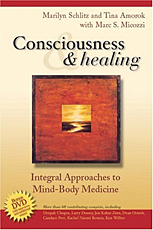Here is a encyclopedic volume that could be advertised as containing everything you ever wanted to know about integral approaches to mind-body medicine. It is totally fitting that Ken Wilber, a pioneer in this field, gets things rolling with a thought-provoking essay on "The Integral Vision of Healing." Its aim is "to utilize as complete and as comprehensive an approach as possible in treating any disease."
In her preface, Marilyn Schlitz (a columnist in Spirituality & Health magazine) outlines this new perspective in medicine by defining its key tenets (which we are both quoting and paraphrasing here):
1. Integral medicine refers to a medicine that heals. It is a dynamic, holistic, life-long process that brings about transformation, growth, and the restoration of wholeness. Health is seen not as the absence of disease, but as a process by which individuals maintain their ability to develop meaning systems that allow them to function, heal, and grow in the face of changes in themselves, their relationships, and the world.
2. Consciousness is a process that involves our awareness of ourselves and the world, including our thoughts, feelings, sensations, identity, and worldviews. Body, mind and spirit interact in shaping the individual, developmental, and evolutionary potentials of human beings.
3. An integral perspective requires a deep examination of our core assumptions about reality and our place in it. No science and no medicine is possible independent of consciousness.
4. Healing has a place for science, self-reflection, and inner knowing. A focus on the material basis of reality may not be the only or even the best way to look at issues inherent in healing.
5. Integral medicine involves a deep appreciation for the multiple cultural perspectives and approaches that contribute to the fullness of healing as a complex, dynamic, and multifaceted phenomenon. It honors and incorporates the world's wisdom and healing traditions.
6. Harnessing the desire for health and healing and the will to live is important in integral medicine.
7. An expanded view of the person, in which the biological, phenomenological, cultural, and transpersonal come together in a meaningful synergy, is called for in this approach to mind-body medicine.
8. The well-being of the planet and the well-being of the individual go hand-in-hand. Integral medicine is concerned with transforming human consciousness to create life enhancing ways of being in the world. This calls for deep social and ecological healing.
9. Life is the greatest teacher. Gratefulness, love, and compassion are essential tools to an inclusive and full-hearted heaing system.
Schlitz salutes the contributions of the Institute of Noetic Sciences for three decades of research on consciousness and healing. More definitions of integral medicine by Elliott Dacher, John Astin and Alexander W. Astin, and William Benda fill out part one of the book
Part two maps the healing system with essays on what is being learned from research mind and mindfulness in mind-body medicine, the psychosomatic network, and psychological aspects of mind-body medicine as it applies to cancer patients. Other essays cover new perspectives on the body, re-visioning illness, and honoring the spectrum of life. Standout essays in this area include Larry Dossey on "What Does Illness Mean" and Joseph Chilton Pearce on "The Conflict of Biological and Cultural Imperatives."
Part three explores healing as a movement to wholeness. Here are essays by Stanislav Grof on psychology, Jeff Levin on spirituality, Larry Dossey on prayer, Frederic Luskin on forgiveness, Brother David Steindl-Rast on gratefulness, and Jon Kabat-Zinn on the contemplative mind in society.
Chapter four contains heavy-duty essays that honor the multiple ways of knowing with pieces on shamanic ways of consciousness by Stanley Krippner, on traditional Chinese medicine by Garret Yount, Yifang Qian and Honglin Zhang, and on the spiritual heart of Tibetan medicine by Sogyal Rinpoche. The final section covers the challenges of envisioning a new story for health and healing with essays by Rachel Naomi Remen, Brian Swimme and Thomas Berry, and James S. Gordon whose topic is "The White House Commission on Complementary and Alternative Medicine Policy and the Future of Healthcare." A most appropriate final essay by Thomas Berry is titled "Reinventing the Human."
In addition to this extensive exploration of the multiple dimensions of integral medicine with 67 authorities in health and healing, Schlitz and company have a special added value treat in store for all who purchase this volume. There is a DVD containing 50 minutes of documentary video from leaders in integral medicine along with 9 additional audio essays with links to the Institute of Noetic Sciences website for text versions.
